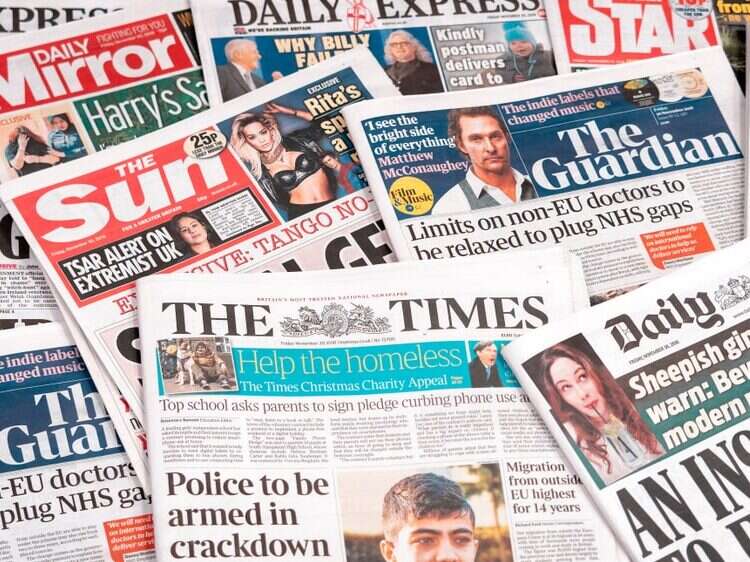
The UK has one of the lowest levels of trust in news as well as one of the highest levels of news avoidance, according to a new study.
The 2023 Digital News Report from the Reuters Institute for the Study of Journalism found that trust in news in the UK was just at 33% – joint 12th lowest among the 46 markets studied.
Interest in news meanwhile has sharply declined from 70% in 2015 to at 43% this year as neither the war in Ukraine nor the cost of living crisis had led to sustained interest and trust levels in news.
News avoidance, a key concern for news leaders, remained high as audiences continue to selectively avoid news. Over a third (36%) of people across markets said that they avoided news often, which was two percentage points lower than last year but seven percentage points higher than 2017.
While the proportion of people avoiding the news often or some of the time was lower in the UK this year compared with 2022 (41% vs 46%), the UK continues to have one of the highest rates on this measure.
The UK also had one of the highest shares of people who said that they were totally "disconnected" from the news, with 9% of people saying they did not consume any news in the previous week. Only Japan (17%) and the US (12%) scored higher, while the share in Germany was also 9%.
News avoidance: What people avoid and why
Younger and hard to reach groups were particularly likely to say they were less interested in news, while people in countries that were more politically divided also avoided the news more. Greece, which the report noted has recently seen heated debates about press freedom and independence, recorded the highest rate for news avoidance jointly with Bulgaria: 57% in each country said they sometimes or often actively avoided the news.
This year the study took a closer look at how people avoided news and why. Just over half (53%) of people who said they avoided the news reported that they do this in a broad-brush way by, for example, ignoring news in their social media feeds or switching off the television when the news came on.
Others tried to check news less often, for example by disabling news alerts on their phones (52% of avoiders), while another group (32%) avoided news on certain topics that they considered to be depressing, emotionally draining or "too repetitive".
News avoiders were most likely to skip over stories on the war in Ukraine (39%), national politics (38%), social justice (31%), crime (30%), and celebrity news (28%).
Report lead author Nic Newman said: "It is clear that many websites and apps are optimised for those that are super-engaged with every twist and turn of today’s news (and politics) agenda. But these approaches also seem to be turning large sections of the public away – with potential long-term implications for civic and democratic engagement."
The report said that while there was no simple solution to low engagement with news, less sensationalist, more positive, and more explanatory formats could help.
Link between falling trust and news avoidance
One factor contributing to the decline in engagement has been falling trust. Across all the countries looked at, trust in news fell by two percentage points, reversing some of the gains made during the pandemic. Some 40% of people said they trusted news most of the time.
In the UK, among the 2,107 people surveyed online, trust has fallen to 33% from 51% in 2015. Finland was the country with the highest level of trust at 69%.
Among 15 leading UK newsbrands asked about, the BBC was most trusted with 61% of people saying they trusted the BBC, compared to 21% who said they did not. The public broadcaster was followed by two other broadcasters, Channel 4 News (59% trust) and ITV (58%).
Along with national broadsheet titles, all UK public broadcasters increased their trust levels in the last year, although the BBC remains down from its 2018 trust level of 75%.
Least trusted was The Sun (13%) and fellow News UK property TalkTV (20%). The Mirror was third-least trusted (23%).
The research linked low levels of trust with criticism of news media, finding some of the highest levels of media criticism in countries such as the UK, Greece, Philippines and US where trust in media was low.
While politicians or political activists were often cited as a source of media criticism, in the UK survey respondents were most likely to say that they had seen criticism of the press from celebrities, comedians and social media personalities. Prince Harry and actor Hugh Grant who has been a proponent voice in the Hacked Off campaign are among the UK’s most outspoken press critics and both have ongoing litigation against national newspaper publishers.
The study also looked at what consumers think about how news they are shown is selected, with most of the public sceptical of the use of algorithms to select the news shown through search engines, social media, and other platforms.
People who trusted news more, or were very interested in news, were however more likely to say that both algorithmic and human selection of news were good ways of choosing stories. Half of those who strongly agreed that they can trust most news most of the time said that automatic selection based on past consumption habits (52%) and selection by editors and journalists (55%) were good ways to get the news.
Email pged@pressgazette.co.uk to point out mistakes, provide story tips or send in a letter for publication on our "Letters Page" blog
